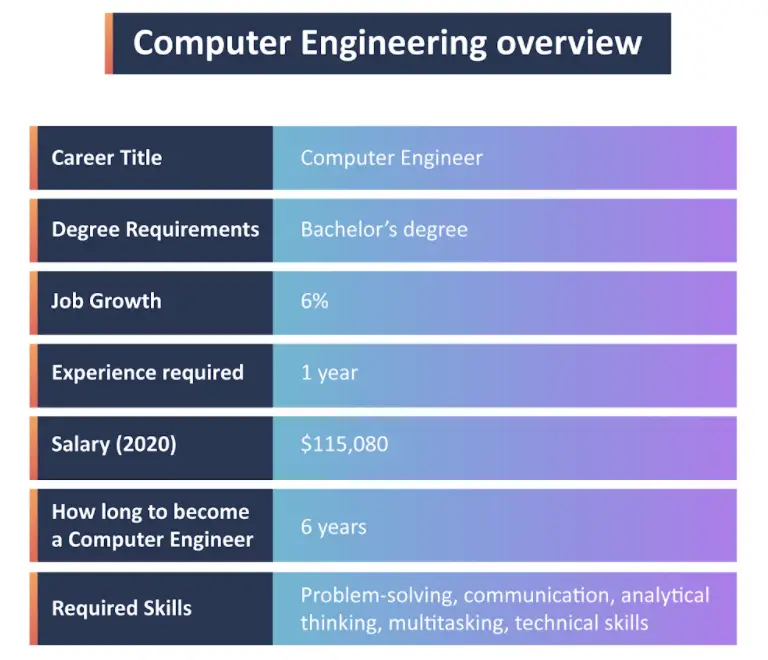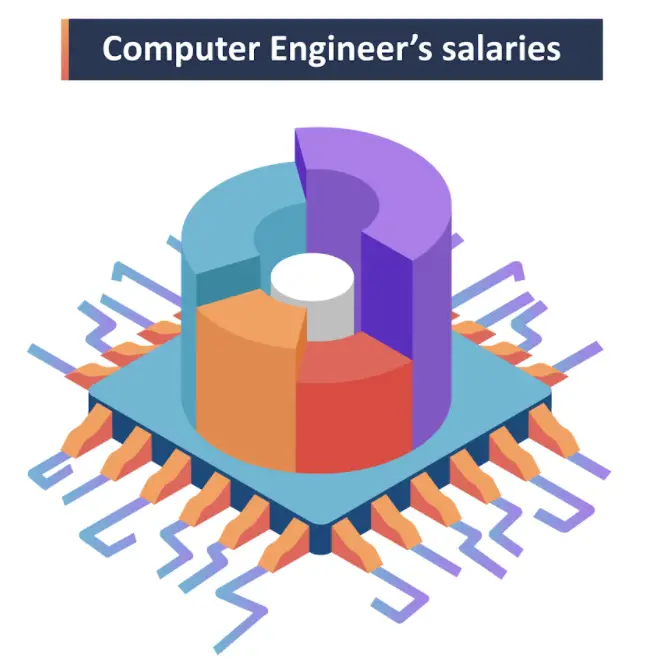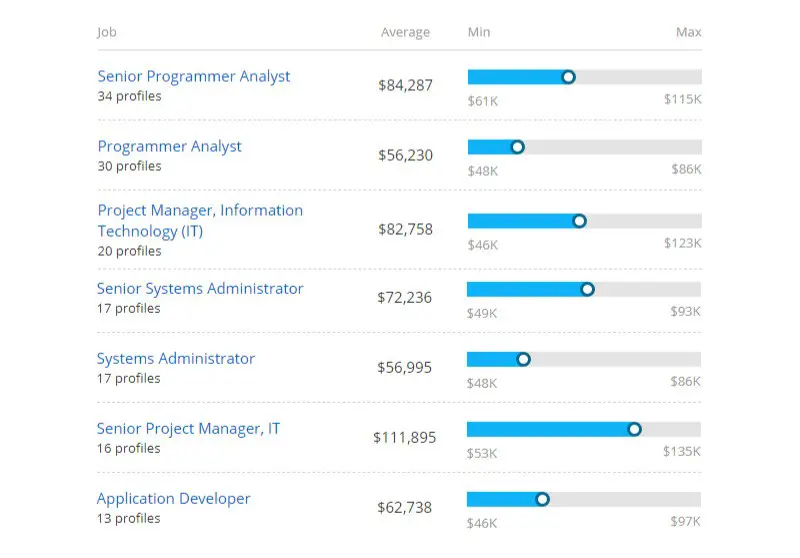How to become a Computer Engineer
This article provides in-depth information into What is a Computer Engineer? What Computer Engineers do? Degrees for Computer Engineers, Steps to become Computer Engineer and much more.
Every student interested in programming and computers thinks about pursuing computer engineering as a career.
A computer engineer deals with the development, deployment, and maintenance of computer systems, networks, and infrastructure. Computer engineers work with both hardware and software, ensuring that they are seamlessly integrated and functioning properly.
To become a computer engineer, you can follow these steps:
- Earn a bachelor's degree in computer science/computer engineering from an accredited computer engineering program
- Pursue a master's degree in computer engineering
- Gain relevant experience
- Earn a Professional Engineer (PE) license
- Earn certifications
In this article, we’ll walk you through the different options, as well as cover salary expectations and job growth trends.
But first, here’s a high-level overview of the computer engineering field:

What does a Computer Engineer do ?
Computer engineers use their extensive knowledge of computer programming and hardware and software design to make computing applications and platforms more efficient and effective.
There are two main paths that computer engineers can take: hardware and software engineering.
Software Engineers create, test, and debug applications and programs that run on computers, mobile devices, and more.
A computer hardware engineer works on computer components and systems, designing circuit boards, microprocessors, routers, and other embedded devices.
There are many career options for computer engineers of both types, including website development, programming, robotics, and network architecture.
Steps for becoming a Computer Engineer
1
Earn An Associate Degree
Students who cannot afford to attend a four-year bachelor’s degree program may opt for an associate’s degree program in computer engineering or a related IT field. Community colleges and trade schools often offer associate degree programs at a lower price than four-year colleges.
When applying for an associate’s degree program in computer science, students must ensure that the courses they complete in their two years are transferable to a four-year institution. This will give them a leg up if they decide to pursue a bachelor’s degree in the future, saving them time and money.

2
Earn A Bachelor’s Degree
A bachelor’s degree program is the basic requirement for most entry-level jobs in computer engineering. The common curriculum will include coursework in data structures, programming, software design, and systems analysis. It will also consist of advanced training, depending on the student’s interests.
Students can study topics including enterprise architecture, software quality, R&D, and artificial intelligence. While choosing a program, students must ensure that the program is accredited by the Accreditation Board for Engineering and Technology (ABET).

3
Work As An Intern
While pursuing a bachelor’s degree, students should consider looking for internships with companies to gain work experience and learn how the industry works.
Students pursuing degree programs in computer engineering may intern with companies that design and implement products such as operating systems, middleware, computer games, and utility applications.
Students may also opt to intern with non-tech companies that use computer technologies for their operations, such as billing, inventory, and payroll. Students can gain experience as IT support specialists or computer technicians before landing a real job in computer engineering.
An internship during college is a great way to get hands-on experience and make connections in the industry.

4
Get Certified
Although certification is not mandatory, students who opt for certifications along with their bachelor’s degree program have better chances of landing a job early.
There is an array of hardware, software, and security certifications from major tech corporations and third-party organizations. These certifications will help you demonstrate your expertise in different programming languages, operating systems, and software test procedures.

5
Land A Job
Most computer engineers land an entry-level job in computer engineering after completing their bachelor’s degree program.
Students must find job openings in their desired industry, ensure that they meet the minimum qualifications for the job, and follow the application instructions so that hiring managers receive their resume and cover letter.

6
Aim For Higher Studies
Those that are interested in software engineering may find entry-level software engineering jobs enjoyable, but better-paying positions management jobs typically come with a master’s degree.
Most hardware engineers that pursue a master’s degree are those that want to rise to management or leadership roles.
Programs that confer a master’s of business administration are popular because they give computer engineers an understanding of how to manage a team or a company on top of the technical know-how they gained during their undergraduate studies.
Earning a master’s degree can come with a big pay bump. Those who are looking for even higher-level roles, or who want to teach, may want to pursue a doctorate.

Computer Engineer Degree Levels
Associate
Students can select two educational paths at the associate degree level: Electronics and Computer Technology or pre-engineering with a computer and electrical engineering emphasis.
The Associate’s degree program in Electronics and computer technology offers a career-focused program that allows students to either continue their education at the bachelor’s degree level or to land an entry-level job in the field of computer engineering after graduation.
Pre-engineering is designed primarily for students who want to pursue a four-year bachelor’s degree program in computer engineering.
Both programs introduce students to fundamental principles in computer engineering and electronics design, including programming, communications and networking, electronic systems, computer hardware and software, electronic systems, instrumentation, and maintenance and repair.
Depending on the school, these programs typically take two years or require 65–72 credit hours to graduate.
Networking and Internet Technologies
-
Introduction to networking fundamentals
-
Internet applications
-
Relational databases
Objectives
This program usually focuses on the network and its fundamentals. A detailed description of the internet and databases is provided.
Object oriented programming
-
Object-oriented programming
-
Data abstractions
-
Algorithm analysis and design
Objectives
This program focuses on object-oriented design programming techniques, including different programming languages, and data manipulation.
Data communication and Networking
-
Data security
-
Signal processing
-
TCP/IP communication
Objectives
Introduces students to the basics of data communications, networking, and the Internet.
Bachelors
There are three primary degrees students can earn at the bachelor’s level:
- Bachelor of Science in Computer Science and Engineering (BSCSE)
- Bachelor of Science in Computer Engineering (BSCE)
- Bachelor of Science in Computer Engineering Technology (BSCET)
While the curriculum varies by program type, each program features a balanced approach to the study of computer engineering, with an emphasis on the design, integration, and support of computer hardware, software, and network systems.
The curriculum is divided between general education and computer engineering classes and typically requires 120 to 128 credit hours to successfully complete the program. The aim of the program is to develop the foundations of technical skills in students. Students study programming languages, databases, electro-mechanical systems, and computer and network
Advanced Programming
-
Problem definition and program design
-
Algorithm programming
-
UNIX, PHP, C languages
Objectives
This program is a broad study of the C language, including its structure, style, operators, and problem-solving
Embedded System
-
Multi-threaded programming
-
Assembly language programming
-
Computer organization
Objectives
A detailed study of components of the embedded system.
Applied programming
-
MATLAB language and environment
-
Input/output programming
-
Top-down design
Objectives
This program focuses on the study of computer programming design which includes MATLAB environments.
Masters
A master’s degree in computer engineering is designed either for those who want to pursue higher studies or those that want career advancement.
Depending on the student’s professional and educational goals, there are two programs at the master’s degree level to choose from — a Master of Science in Computer Engineering or a Master of Engineering in Computer Engineering.
While a master’s of science is a research-based program requiring students to complete independent research that culminates with a thesis project, a master’s of engineering is a professionally-focused program aiming to allow students opportunities to explore professional interests, both within and outside the field of computer engineering.
Master’s degrees typically require 30 to 33 credit hours, which is equivalent to two years of full-time study and allow students to concentrate their program in specialized areas like hardware and computer architecture, software, cybersecurity, computer communications, and networks, to name a few.
Distributed Computing
-
Distributed algorithms
-
Resource allocation
-
Byzantine agreement
Objectives
This program focuses on the understanding of distributed computer and information processing.
Advanced computer networks
-
Complex network systems
-
Network visualization
-
Mobility issues
Objectives
This program focuses on the principles and protocols used in network systems.
Computer architecture
-
Trends in processor and memory design
-
Quantitative analysis
-
High-performance processors
Objectives
An advanced study of the organization of computer systems, functionality, design, and performance.
Doctoral Degree
Those that want to pursue a career in academia, applied research, or government work, may pursue doctoral degree programs in computer engineering.
In order to earn a doctoral degree program in computer engineering, students must complete their master’s degree and an additional 32-36 credit hours.
Areas of study in a doctoral program are determined by students’ interests and faculty research areas. This area of interest may cover a multitude of aspects in computing theory, software, hardware, and computing applications.
Earning a Ph.D. in computer engineering includes a research examination, comprehensive examinations, a dissertation, and a successful defense of the dissertation before a graduate jury.
By the time you finish a doctorate, you have probably exhausted your finances. If you need help getting your finances under control, check our list of the Best Student Loans available with affordable plans and interest rates.
Online computer engineering degrees and schools
One of the major benefits of online degree programs is convenience. Through online programs, students can gain industry-specific skills and prepare themselves for the professional world.
Below are the three factors that students should keep in mind while opting for online degree programs in computer engineering.
ABET Accreditation:
While choosing an online program for computer engineering, students should ensure that it is accredited by The Accreditation Board for Engineering and Technology, Inc. (ABET).
ABET reviews multiple criteria of computer engineering programs, including curriculum, student performance, student outcomes, faculties, facilities, and resources.
Faculty experience and professional background:
The caliber of the department's faculty and instructors determines the quality of the program and the subsequent success rate of the students.
For an online degree program in computer engineering, students should carefully review each faculty member’s background, education, and professional experience. Students should opt for programs where faculty members have real-world or research experience in their field of interest.
Specializations and breadth of Instruction:
Students should review the curriculum of each potential program so as to ensure they are provided with fundamental instruction in both electrical engineering and computer science. Students should also examine the progression of learning.
Also to guide you on this, there is a guide to the Top Online Computer Science Degree Programs, which details the career prospects, tuitions, student financial aid, and accreditation of various programs.
Popular Certification Programs
In the world of tech, certification programs are a great way to learn more about specialized topics. They can also help you show your skills to employers and increase your income, making them well worth the investment.
That’s true whether you have a high-level computer engineering degree or not.
Some employers require these certifications or will pay the cost for employees who want to earn them. Check with your company to see if they offer assistance in paying for classes, exams, or study materials. Some even offer automatic pay increases upon certification.

CompTIA A+
Someone looking to land an entry-level computer job will benefit heavily from the CompTIA A+ certification. This program teaches its students about a wide variety of computer technologies, including hardware and software. It also teaches basic troubleshooting and problem-solving techniques.
If you want to start your career by working in technical support or give yourself a good baseline knowledge of how to fix computer-related problems, this program is a strong choice.
Cisco Networking Certifications
Computer engineers that want to get into networking should look into the Cisco Certified Network Associate (CCNA) and Professional (CCNP) programs.
These programs educate students on the latest networking technologies and concepts. Those who have these certifications should be equipped to help businesses design and implement computer networks.
Security Certifications
Information Systems Audit and Control Association (ISACA) is a group that focuses on technology, security, and governance. It offers multiple certification programs for people who want to learn about cybersecurity.
These programs include:
- Certified information systems auditor. This certification focuses on teaching students how to monitor and manage IT systems securely.
- Certified information security manager. This program teaches students about how to design and implement security systems and policies.
- Certified in risk and information systems control. This is a program that teaches risk assessment, risk identification, how to respond to and mitigate security breaches, along with risk control, monitoring, and reporting.
There are also programs, like ethical hacking and penetration testing, that can teach computer engineers about how to test the security of a computer network.
Management Certifications
Many computer engineers know a lot about the technical side of things, but don’t have as much knowledge when it comes to managing people and projects. These certification programs are designed to help computer professionals transition to management roles effectively.
- Project Management Professional: This program teaches students the basics of managing projects, both large and small, as well as how to direct a team to complete those projects. There are many specialties available in the program, so students can focus on the topics that interest them.
- Certified ScrumMaster: Scrum is a popular framework for technology companies that want to remain agile and flexible when it comes to managing projects and achieving goals. This program teaches students about the framework, how to implement it, and how to use it to develop, deliver, and maintain products.
Computer Engineer’s salaries
According to the Bureau of Labour Statistics, the average salary earned by a computer engineer is about $115,080.

It typically ranges between $66,870 and $172,010, depending on the education, skills, experience gained in this field, and more.
Job growth
The demand for computer engineers has rapidly increased due to their activities and roles required in virtually every field.
It is estimated that the profession will grow to about 6% by the end of 2028, hence increasing job opportunities.
Career-oriented students can increase their caliber by meeting the qualification required for a computer engineer and become more employable in this competitive world.
Conclusion
Computer engineering is a field that is high in demand. It also gives students multiple career paths.
Whether you like working with computer hardware or prefer software, a computer engineering education will leave you well-positioned to land the job that you want and earn a good salary.
